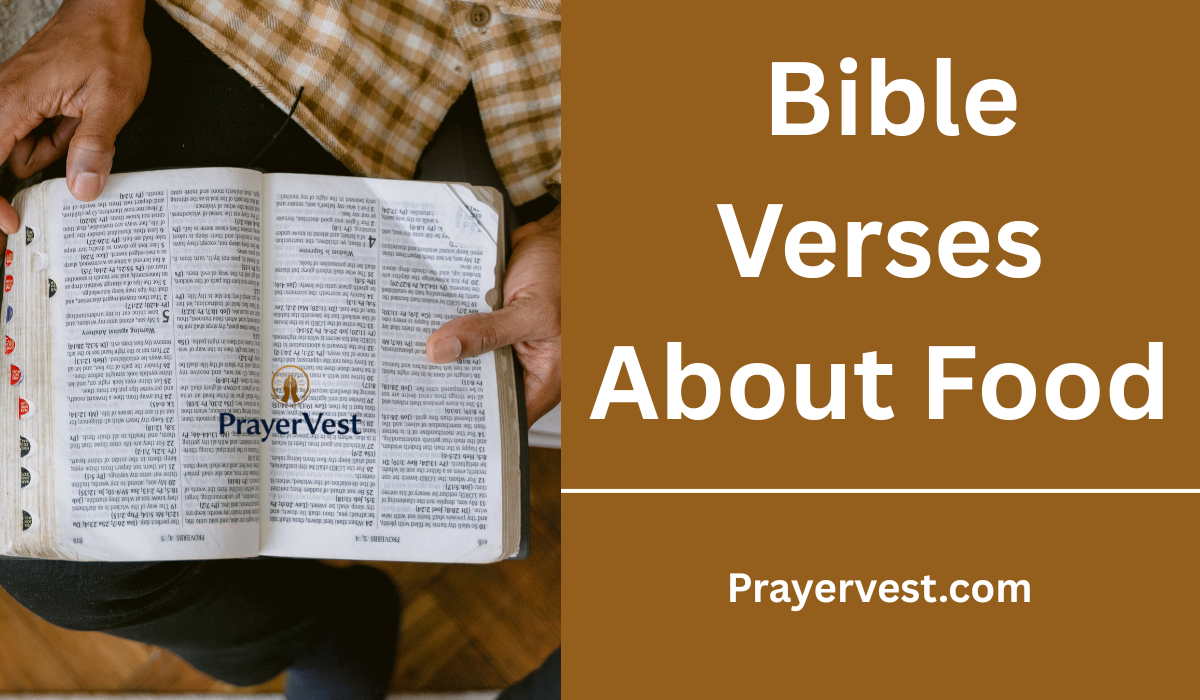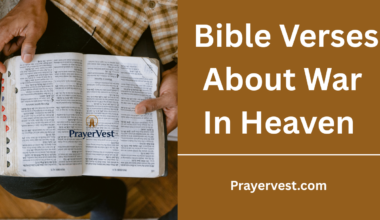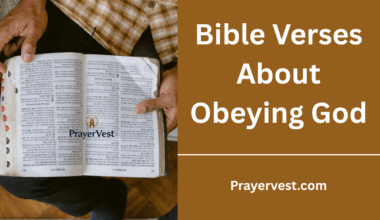In addition to being a source of bodily sustenance, food has always had a special position in the Bible as a symbol of blessing, supply, and spiritual sustenance. Scripture demonstrates how God provides for His people in both concrete and symbolic ways, from the manna in the wilderness to the miracle feeding of the five thousand. These verses serve as a reminder that every meal is a chance to honor God’s kindness, acknowledge His generosity, and develop thankfulness for the everyday gifts that keep us alive.
In the Bible, food frequently has profound spiritual meaning that goes beyond simple nutrition. Meals are shown as times for covenant, camaraderie, and communion. Jesus’ sharing of bread and wine with His followers highlights the relationship between physical food and spiritual life and foreshadows the ultimate spiritual sustenance found in Him. The Bible exhorts Christians to view food as a gift from God, a reminder of His concern, and a means of building relationships among communities, families, and the body of Christ.


The Bible also offers advice on how we should approach and eat food. God’s desire for comprehensive well-being is reflected in the concepts of moderation, gratitude, and purity. Some verses stress that how we treat food reflects the state of our hearts and caution against gluttony, overindulgence, or the neglect of the poor. We can learn more about God’s provision, His plans for human development, and the spiritual truths found in commonplace activities like eating and sharing meals by studying Bible texts concerning food.
40 Inspiring Bible Verses About Food (2026)
1. Genesis 1:29
“Then God said, ‘I give you every seed-bearing plant on the face of the whole earth and every tree that has fruit with seed in it. They will be yours for food.’”
From the very beginning, God provides sustenance for humanity through creation. This verse reflects God’s provision and intentional design, showing that food is not only necessary for survival but is a gift to be received with gratitude. It underscores the divine intention for humans to coexist with the natural world in harmony.
2. Exodus 16:4
“Then the Lord said to Moses, ‘I will rain down bread from heaven for you. The people are to go out each day and gather enough for that day.’”
In the wilderness, God demonstrates His faithful provision by giving manna to the Israelites. This daily sustenance teaches reliance on God for immediate needs and reminds us that He provides exactly what we require. The miracle of manna highlights that God’s timing and measure are perfect.
3. Leviticus 11:3
“You may eat any animal that has a divided hoof and that chews the cud.”
God establishes dietary laws for His people, guiding them in discerning clean from unclean foods. Beyond health and hygiene, these instructions symbolize obedience, holiness, and reverence for God’s design. Food, therefore, becomes both nourishment and a spiritual discipline.
4. Deuteronomy 8:3
“He humbled you, causing you to hunger and then feeding you with manna, which neither you nor your ancestors had known, to teach you that man does not live on bread alone but on every word that comes from the mouth of the Lord.”
This verse reminds us that food sustains the body, but God’s word sustains the soul. Physical hunger becomes a metaphor for spiritual dependency, emphasizing the ultimate provision that comes from God.
5. Psalm 104:14-15
“He makes grass grow for the cattle, and plants for people to cultivate—bringing forth food from the earth: wine that gladdens human hearts, oil to make their faces shine, and bread that sustains their hearts.”
The psalm celebrates God’s provision in creation. Food is both practical sustenance and a source of joy, highlighting God’s desire for abundance and delight in the lives of His people.
6. Proverbs 15:17
“Better a small serving of vegetables with love than a fattened calf with hatred.”
This verse teaches that the quality of relationships and the spirit in which food is shared matters more than the quantity or extravagance of the meal. Food becomes a symbol of fellowship, love, and peace.
7. Matthew 4:4
“Jesus answered, ‘It is written: Man shall not live on bread alone, but on every word that comes from the mouth of God.’”
Jesus reinforces the teaching of Deuteronomy, showing that spiritual nourishment outweighs physical hunger. Food provides temporary sustenance, but God’s word sustains life eternally.
8. John 6:35
“Then Jesus declared, ‘I am the bread of life. Whoever comes to me will never go hungry, and whoever believes in me will never be thirsty.’”
Here, food becomes a profound metaphor for salvation. Jesus satisfies our deepest needs, illustrating that true sustenance is found in spiritual communion with Him.
9. Acts 2:46
“Every day they continued to meet together in the temple courts. They broke bread in their homes and ate together with glad and sincere hearts.”
Sharing meals strengthens community and fellowship. Food serves as a medium for gratitude, joy, and relational bonding among believers.
10. 1 Corinthians 10:31
“So whether you eat or drink or whatever you do, do it all for the glory of God.”
Even mundane acts like eating are opportunities to honor God. This verse teaches mindfulness and gratitude, reminding us that all provisions ultimately come from Him.
11. Psalm 145:15-16
“The eyes of all look to you, and you give them their food at the proper time. You open your hand and satisfy the desires of every living thing.”
This verse highlights God’s perfect timing and providence. Every creature, from the smallest to the greatest, depends on Him for sustenance. Food here is not just physical nourishment but a reflection of God’s care, attentiveness, and generosity. It reminds us that we are never overlooked; God knows our needs and provides in abundance. The broader lesson is that reliance on God transforms daily meals into moments of gratitude, mindfulness, and recognition of His ongoing provision.
12. Proverbs 31:14-15
“She is like the merchant ships, bringing her food from afar. She gets up while it is still night; she provides food for her family and portions for her female servants.”
This passage praises diligence, foresight, and love in providing sustenance for others. Food here symbolizes care, stewardship, and the tangible expression of devotion within a household. Beyond physical nourishment, it reflects a spiritual posture of readiness and generosity. Those who use their resources wisely and thoughtfully feed not only bodies but also hearts, fostering trust, security, and harmony within their communities.
13. Isaiah 55:2
“Why spend money on what is not bread, and your labor on what does not satisfy? Listen, listen to me, and eat what is good, and you will delight in the richest of fare.”
Isaiah calls us to discern true nourishment from what is superficial. Physical food sustains the body, but spiritual and moral sustenance sustains life’s deeper longing. God invites His people to prioritize that which truly satisfies—His wisdom, guidance, and presence. Food becomes a metaphor for what we consume mentally, emotionally, and spiritually, encouraging us to seek what enriches and nourishes our souls rather than fleeting indulgences.
14. Jeremiah 31:12
“They will come and shout for joy on the heights of Zion; they will rejoice in the bounty of the Lord—the grain, the new wine, and the olive oil, the young of the flocks and herds. They will be like a well-watered garden, and they will sorrow no more.”
Here, food represents abundance, celebration, and divine blessing. God’s provision is holistic—it feeds the body, brings joy to the spirit, and restores hope. The imagery of a well-watered garden emphasizes flourishing, peace, and a life filled with delight. Food, in this context, is symbolic of God’s generous care, reminding us that rejoicing over His provision is both natural and spiritually restorative.
15. Matthew 14:19-20
“And he directed the people to sit down on the grass. Taking the five loaves and the two fish and looking up to heaven, he gave thanks and broke the loaves. Then he gave them to the disciples, and the disciples gave them to the people. They all ate and were satisfied.”
The miracle of the feeding of the 5,000 shows that food can be a conduit of God’s miraculous power. Gratitude, faith, and sharing transform ordinary food into extraordinary provision. Beyond satisfying hunger, this act illustrates abundance, generosity, and divine orchestration. It teaches us that God can multiply our resources to meet needs far beyond what we imagine, and that sharing with faith amplifies blessings for everyone involved.
16. Luke 12:22-24
“Then Jesus said to his disciples: ‘Therefore I tell you, do not worry about your life, what you will eat; or about your body, what you will wear. For life is more than food, and the body more than clothes. Consider the ravens: They do not sow or reap, they have no storeroom or barn; yet God feeds them. And how much more valuable you are than birds!’”
Jesus teaches that food is a reminder of God’s provision, not a source of anxiety. Observing God’s care for creation should give us confidence in His care for us. Physical sustenance is a tool for life, but God values and provides for us far beyond the mere necessities. This perspective encourages us to live with trust, gratitude, and freedom from worry, seeing food as part of a broader, divine ecosystem of care and abundance.
17. John 21:9-13
“When they landed, they saw a fire of burning coals there with fish on it, and some bread. Jesus said to them, ‘Come and have breakfast.’ None of the disciples dared ask him, ‘Who are you?’ They knew it was the Lord. Jesus came, took the bread and gave it to them, and did the same with the fish.”
Food in this scene symbolizes fellowship, restoration, and intimate connection with Christ. Sharing a simple meal becomes an act of reconciliation, remembrance, and spiritual intimacy. It reminds us that God uses the ordinary—bread, fish, a shared table—to meet hearts, rebuild trust, and nurture relationships. Meals are sacred opportunities for presence, teaching, and communion.
18. Acts 10:13-15
“Then a voice told him, ‘Get up, Peter. Kill and eat.’ ‘Surely not, Lord!’ Peter replied. The voice spoke to him a second time, ‘Do not call anything impure that God has made clean.’”
Here, food represents spiritual truth and transformation. God challenges Peter to see beyond cultural or ritualistic restrictions and embrace the fullness of divine provision. Food becomes symbolic of inclusivity, blessing, and the removal of unnecessary boundaries. The lesson is profound: what God provides—physically or spiritually—is inherently good and part of His plan for nourishment, restoration, and unity.
19. 1 Timothy 4:4-5
“For everything God created is good, and nothing is to be rejected if it is received with thanksgiving, because it is consecrated by the word of God and prayer.”
This verse frames food as sacred when approached with gratitude. Beyond the physical act of eating, it teaches us mindfulness, reverence, and acknowledgment of God’s sovereignty. Receiving food with thankfulness transforms ordinary meals into acts of worship, shaping our hearts toward joy, humility, and a deeper awareness of God’s provision in every aspect of life.
20. Revelation 19:9
“Then the angel said to me, ‘Write this: Blessed are those who are invited to the wedding supper of the Lamb!’”
Food here symbolizes eternal fellowship and divine celebration. The imagery of the wedding feast transcends physical hunger to represent spiritual fulfillment, communion with God, and ultimate joy. Meals in Scripture often carry both earthly and heavenly significance, illustrating how food can be a foretaste of divine blessing, eternal abundance, and intimate relationship with our Creator.
21. Proverbs 25:16
“If you find honey, eat just enough—too much of it, and you will vomit.”
This verse teaches moderation and self-discipline in our consumption. Food symbolizes both blessing and potential overindulgence. Excess, even of something sweet and good, can harm us. Spiritually, it reminds us that all good things—from food to relationships to wealth—are best received with wisdom and gratitude. Practicing moderation cultivates health, balance, and an awareness of God’s provision without becoming enslaved by desire.
22. Psalm 136:25
“He gives food to every creature. His love endures forever.”
Food here reflects God’s unending love and care. From the smallest animal to humanity, all creation is nourished by His hand. This verse encourages reflection on God’s constancy, generosity, and attentiveness. When we eat, we participate in a divine rhythm of care, reminding ourselves that life is sustained not by our effort alone but by a loving Creator who provides abundantly and continuously.
23. Ruth 2:14
“At mealtime Boaz said to her, ‘Come over here. Have some bread and dip it in the wine vinegar.’ When she sat down with the harvesters, he offered her some roasted grain. She ate all she wanted and had some left over.”
Food is a vehicle for kindness, inclusion, and care in human relationships. Boaz’s generosity nourishes both body and spirit, showing that sharing meals fosters community, dignity, and trust. This story reminds us that God’s provision often comes through the hands of others, and sharing food is an act of grace, blessing both giver and receiver.
24. Deuteronomy 12:7
“There, in the presence of the Lord your God, you and your families shall eat and shall rejoice in all the wealth the Lord your God has given you.”
Food becomes an expression of gratitude and celebration before God. Eating together is more than survival—it is worship, fellowship, and acknowledgment of God’s abundant gifts. Sharing meals with thanksgiving transforms ordinary sustenance into a sacred, joy-filled experience, nurturing both body and spirit.
25. Matthew 26:26
“While they were eating, Jesus took bread, and when he had given thanks, he broke it and gave it to his disciples, saying, ‘Take and eat; this is my body.’”
In the Last Supper, bread becomes a profound symbol of sacrifice, unity, and spiritual sustenance. Food here is not just physical nourishment; it represents Christ’s presence, offering, and the covenant of salvation. Every meal shared in faith can become a moment of reflection, remembrance, and spiritual connection with God and one another.
26. Mark 6:41
“Taking the five loaves and the two fish and looking up to heaven, he gave thanks and broke the loaves. Then he gave them to his disciples to distribute to the people.”
Jesus demonstrates that gratitude transforms simple food into abundance. God multiplies what is offered in faith, showing that the act of giving, sharing, and thanking Him can turn scarcity into plenty. This story teaches that food is both a literal and metaphorical tool of divine provision, encouraging generosity and trust in God’s power to provide.
27. Ecclesiastes 3:13
“That each of them may eat and drink, and find satisfaction in all their toil—this is the gift of God.”
Food symbolizes the tangible blessings of labor and the joy that comes from God’s provision. Savoring meals mindfully reflects gratitude and recognition of God’s gifts. Beyond mere consumption, it calls us to celebrate life’s simple pleasures and acknowledge that God’s provision is a source of contentment and spiritual fulfillment.
28. Genesis 3:19
“By the sweat of your brow you will eat your food until you return to the ground, since from it you were taken; for dust you are and to dust you will return.”
This verse reminds us of the effort, impermanence, and humility inherent in sustaining life. Food connects us to creation, labor, and mortality. It teaches reverence for the earth and gratitude for God’s provision, highlighting that our daily sustenance is both a physical necessity and a spiritual opportunity to acknowledge dependence on God.
29. Leviticus 23:40
“On the first day you are to take choice fruits from the trees, branches of palm trees, boughs of leafy trees, and willows of the brook, and rejoice before the Lord your God for seven days.”
Food is intertwined with celebration and worship. Harvested fruits symbolize God’s provision and invite us to rejoice in His abundance. The act of eating becomes a communal, spiritual practice, expressing gratitude, joy, and acknowledgment of God’s hand in the cycle of life and nourishment.
30. Isaiah 25:6
“On this mountain the Lord Almighty will prepare a feast of rich food for all peoples, a banquet of aged wine—the best of meats and the finest of wines.”
This prophetic feast points to God’s ultimate provision and divine blessing. Food symbolizes abundance, fellowship, and the fulfillment of God’s promises. It is both literal and spiritual, illustrating the joy, satisfaction, and unity found in God’s kingdom. Meals, therefore, are not only for survival but also a foretaste of eternal communion and celebration with Him.
31. Luke 24:30
“When he was at the table with them, he took bread, gave thanks, broke it, and began to give it to them.”
In the post-resurrection appearance, Jesus uses bread to reveal Himself and strengthen faith. Food becomes a tool of revelation, connection, and spiritual nourishment. Shared meals offer opportunities for encounter, recognition, and communion, showing that sustenance is never just physical—it can awaken the heart to divine presence.
32. John 6:11
“Jesus then took the loaves, gave thanks, and distributed to those who were seated as much as they wanted.”
Gratitude precedes multiplication in this miracle. Food is a symbol of God’s generosity and provision, demonstrating that thanksgiving is not only an attitude but also a channel for God to bless others. It reminds us that sharing what we have, no matter how little, can become a source of abundant blessings for many.
33. 2 Chronicles 31:5
“As soon as the order went out, the Israelites generously gave the firstfruits of their grain, new wine, olive oil and honey, and all that the fields produced.”
Offering food is an act of worship and acknowledgment of God’s sovereignty. Firstfruits symbolize trust, gratitude, and recognition that every blessing comes from Him. The broader lesson is that what we consume or give should reflect reverence, generosity, and joyful acknowledgment of God’s provision.
34. Nehemiah 8:10
“Do not grieve, for the joy of the Lord is your strength.”
While not directly about food, this verse connects to the communal meals of celebration in Israel. Food often accompanies rejoicing and strengthens community. Just as physical sustenance nourishes the body, God’s joy nourishes the soul, reminding us that food and faith together cultivate holistic strength and contentment.
35. Ezekiel 4:9
“Take wheat and barley, beans and lentils, millet and spelt; put them in a storage jar and use them to make bread for yourself.”
Food is both survival and symbolic instruction. Ezekiel uses bread as a tool for teaching obedience, patience, and reliance on God. The preparation and consumption of food become acts of mindfulness, spiritual reflection, and recognition of God’s care even in difficult circumstances.
36. Matthew 15:36
“He took the seven loaves and the fish, gave thanks, broke them, and gave them to the disciples, and they in turn to the people.”
This event underscores the transformative power of gratitude. Food, when blessed and shared, becomes abundant and miraculous. It reminds us that even ordinary resources, when surrendered to God with thanksgiving, can meet extraordinary needs and bring glory to Him.
37. Psalm 34:8
“Taste and see that the Lord is good; blessed is the one who takes refuge in him.”
Food becomes a metaphor for experiencing God’s goodness. Just as tasting food satisfies physical hunger, drawing near to God satisfies spiritual hunger. This verse invites active participation—engaging with God personally and directly, discovering the richness of His love, provision, and faithfulness.
38. Proverbs 31:27
“She watches over the affairs of her household and does not eat the bread of idleness.”
Food here represents the fruits of diligence and care. Providing nourishment is linked to wisdom, stewardship, and responsibility. The verse celebrates disciplined effort, intentionality, and the spiritual dimension of preparing and sharing meals with love.
39. Isaiah 58:10
“And if you spend yourselves in behalf of the hungry and satisfy the needs of the oppressed, then your light will rise in the darkness.”
Feeding others is a spiritual act with eternal significance. Food symbolizes compassion, service, and justice. By providing nourishment, we participate in God’s mission of care, reflecting His love and bringing hope, light, and transformation to those in need.
40. Revelation 3:20
“Here I am! I stand at the door and knock. If anyone hears my voice and opens the door, I will come in and eat with that person, and they with me.”
Food symbolizes intimacy, fellowship, and divine invitation. Sharing a meal with Christ represents spiritual communion, restoration, and relationship. God’s invitation to dine together transcends mere sustenance—it is an offer of connection, presence, and eternal partnership with Him.
Conclusion
Examining biblical passages pertaining to food serves as a reminder that eating is a spiritual activity that symbolizes God’s supply, love, and care rather than just a bodily necessity. Scripture exhorts us to approach food with thankfulness, moderation, and awareness, understanding that each meal is a chance to glorify God and bless others. The Bible shows that food can nourish not just our bodies but also our hearts, brains, and relationships—from the miraculous provision of manna to Jesus’ shared meals with His disciples.
These passages also impart timeless values about stewardship, generosity, and camaraderie. We can learn to take care of ourselves, help those in need, and rejoice in the wealth of God’s blessings by adhering to His food-related instructions. Food becomes a medium for faith, joy, and community, whether via praying before meals, sharing with others, or considering the spiritual significance of bread and wine. In the end, biblical passages concerning food exhort us to live in accordance with God’s values and accept His gift with gratitude, enjoying sustenance for both body and spirit.






